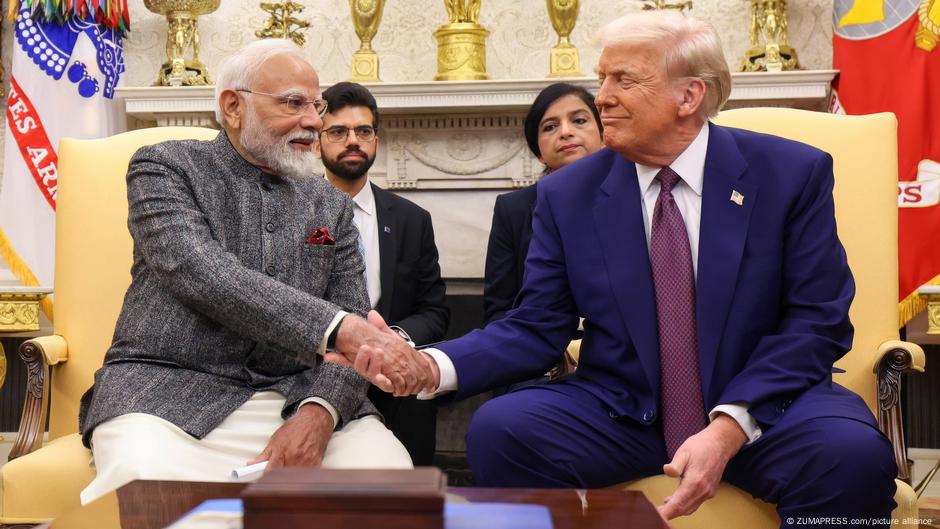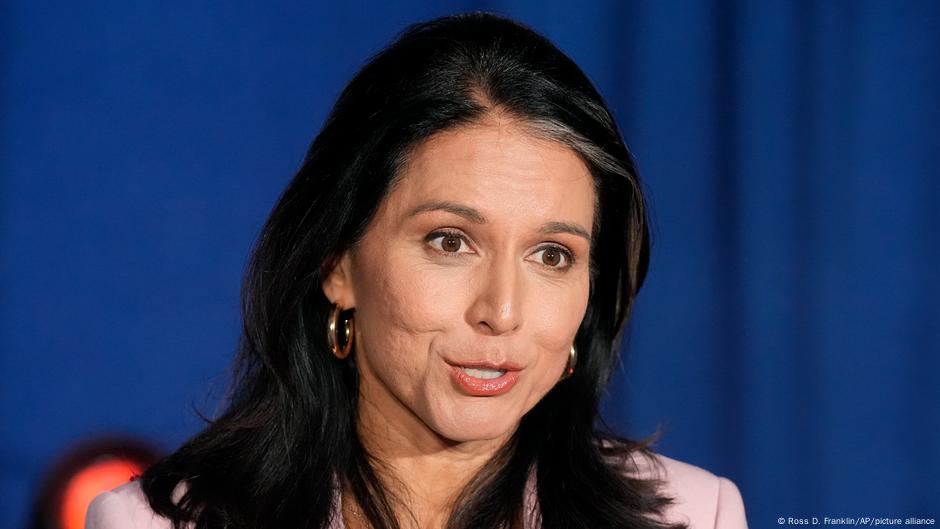While visiting New Delhi for an important engagement, U.S. intelligence leader Tulsi Gabbard stated that both India and the United States plan to enhance their strategic partnership, underlining that "America First" doesn’t imply “America Only.”

US Director of National Intelligence Tulsi Gabbard concluded a two-day trip to India by commending the "significant prospects" for strengthening US-India relations, despite growing concerns among Washington’s allies worldwide due to President Donald Trump's foreign policy stance.
Gabbard, the initial top-tier official from Trump's second administration to travel to India, stated at a security conference in New Delhi this week that Trump’s “dedication” to maintaining peace and stability stems from his “realistic” and “practical” approach.
At the yearly Raisina Dialogue, Gabbard stated that similar to Trump, India's Prime Minister Narendra Modi is dedicated to prioritizing his nation "above all else."
Gabbard stated, ‘This shouldn’t be interpreted as saying “America first” means America isolated,” utilizing one of Trump’s most-used catchphrases. She emphasized that the collaborations we establish are essential for promoting shared goals.'
Trump's recent actions casting doubt on NATO's security guarantees , while embracing Russian narratives on Ukraine , have distanced Washington from its long-standing European allies. This has left those in Asia uncertain about whether they can rely on Washington’s commitment in case of a confrontation with China.
Gabbard, who leads 18 U.S. intelligence agencies, told the strategic conference that attaining peace necessitates leaders who question the prevailing perspective or the status quo.
Who is Trump's closest friend in Asia?
In her comments, Gabbard described Modi and Trump as "great friends." They had their discussion earlier this month in Washington, where they talked about trade relations and defense cooperation. Following his encounter with Gabbard, Modi stated that he was looking forward to hosting Trump in India sometime soon. Additionally, Modi signed up for Trump’s “Truth Social” social networking site on Tuesday.
Regarding Trump's warning about imposing additional tariffs in early April, which would impact India as well, Gabbard stated to the ANI news agency that they had "open communication between leaders" and that Trump and Modi were collaborating on measures that consider the financial interests of both nations.
In an online posting, Modi stated that he and Gabbard talked about their shared dedication to "fighting terrorism as well as boosting collaboration in maritime and cyberspace security."
Chhetra Bahadur Bajpai, a senior fellow focusing on South Asia at the Chatham House research institute, informed Pawnation.com that Gabbard's trip signifies the importance Washington places on its relationship with India.
"Although this isn't novel, the U.S.-India partnership has gained fresh impetus during Trump's tenure as he prioritizes relationships with nations that share his perspectives rather than adhering strictly to historical alliances," Bajpaee commented.

The difficulty posed by the Indo-Pacific region
The United States has established an alliance system across the Indo-Pacific, a vast area encompassing the Indian Ocean near India, the South China Sea, as well as the western part of the Pacific Ocean.
Gabbard, a previous Congress representative from Hawaii, hails originally from the island of American Samoa. As a U.S. security official who practices Hinduism, she retains connections with India and served as part of the House India Caucus when acting as a congressperson. However, she has been criticized for purportedly backing the "Hindutva" movement, which is associated with Hindu nationalism.
On Tuesday, speaking to journalists in New Delhi, she stated that the Indo-Pacific represents the "geopolitical epicenter of the 21st century."
"Safeguarding peace and stability in this region is crucial for our shared security and our aim of achieving economic growth. It is imperative that we address these issues collaboratively," she stated.
Up until now, the language employed by the Trump administration regarding the Indo-Pacific has stayed aligned with that of the preceding administration. The State Department continues to highlight the importance of keeping the area "free and open."
The elephant in the water, viewed by the US and its allies as a threat to this "free and open" Indo-Pacific, is China.
During President Xi Jinping's tenure, China has constructed the globe's biggest naval fleet in terms of ship count. Additionally, Beijing asserts nearly all of the South China Sea—a crucial artery for international commerce—as part of Chinese territory.
Washington’s enduring strategic objective is to prevent Beijing from entirely controlling the Indo-Pacific region and ensure the unrestricted movement of global commerce.
The United States requires partners in the area; however, Trump is not recognized for valuing conventional multinational alliances. With his comeback into power, questions have arisen about whether this will change. The relationships between Washington and both Japan and South Korea remain solidly intact.
Trump has likewise stayed vague about the U.S. pledge to defend Taiwan, which China considers a renegade region, amidst growing pressure from Beijing on the self-governed island after the inauguration of President Lai Ching-te.
During an interview with Bloomberg prior to the US election, Trump, as usual, adopted his characteristic transactional approach, condemned Taiwan for insufficient military spending to counter China's potential threats.
India and the U.S.: Alliance without any conditions?
Although India does not have an official alliance with the US. It also shows an interest in constraining China.
"India is not an official U.S. ally, similar to countries like Japan or South Korea, nor is it considered a U.S. adversary, unlike China. Therefore, India doesn’t face accusations of ‘not contributing enough,’ which often apply to U.S. allies, nor does it represent an existential challenge to America’s worldwide influence as China does,” noted Chatham House analyst Chietigj Bajpaee.
This can be seen in the Quadrilateral Security Dialogue, known as the " Quad," involving Australia and Japan alongside the United States and India. This forum facilitates unbinding strategic cooperation in the Indo-Pacific region, enabling them to collaborate informally without formal alliance obligations.
Bajpaee stated that 'the Trump administration seems to have shown a fresh dedication to the Quad, which can be seen from the gathering ofQuad foreign ministers soon after Trump took office,'
"Rather than formal alliances like NATO, the Trump administration favors more flexible groups such as the Quad. While there are indications that the Trump administration might want to shift the Quad’s emphasis toward stronger security aspects, they certainly aren’t reducing their involvement," he noted.
Prior to the strategy conference, Gabbard had meetings with Modi and Indian Defense Minister Rajnath Singh. The minister characterized these discussions as covering a broad range of topics including collaboration on defense and intelligence matters.
In discussions with Gabbard, Defense Minister Singh asked the U.S. to designate the Sikh separatist group Sikhs for Justice (SFJ) as a terrorist organization. The United States mentioned in 2023 that Indian intelligence agents were allegedly involved in plotting to kill an SFJ leader within their country. However, India has refuted these claims of involvement.
Edited by: Srinivas Mazumdaru
Author: Wesley Rahn


Post a Comment